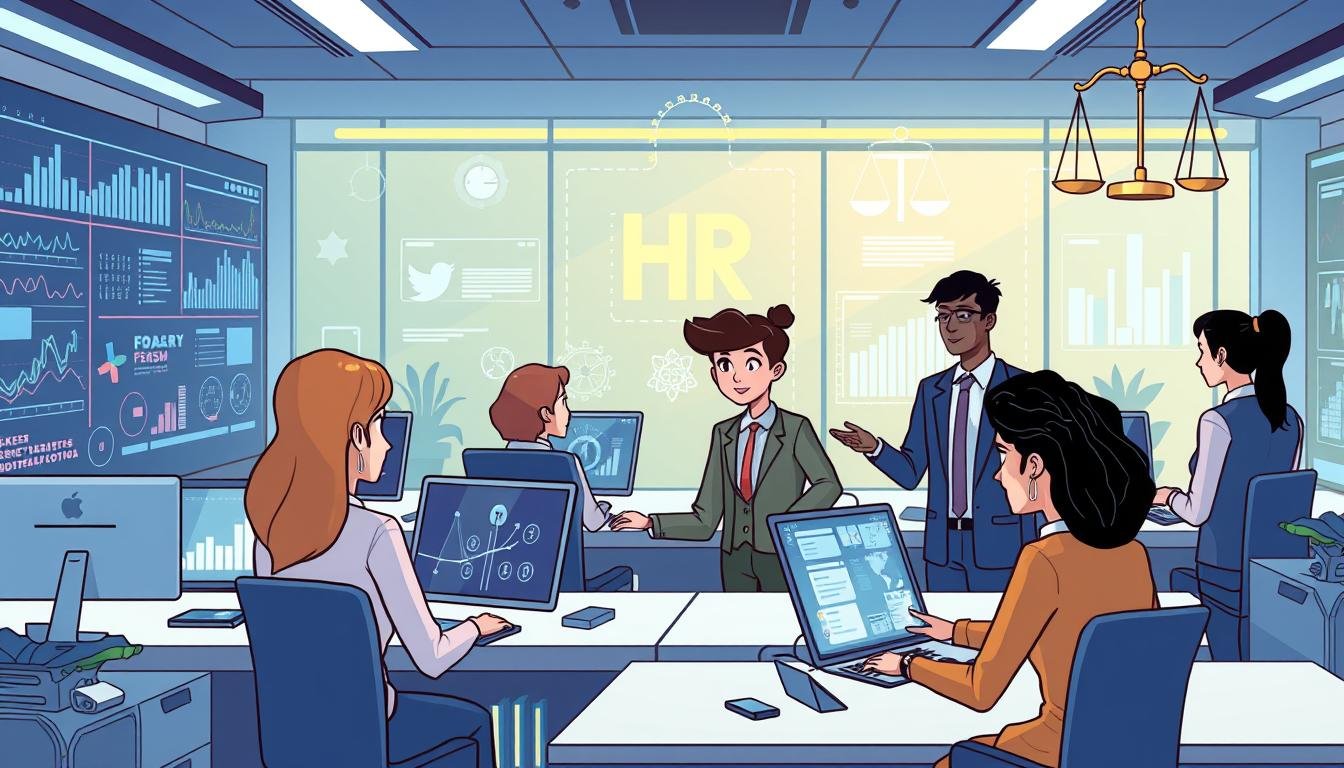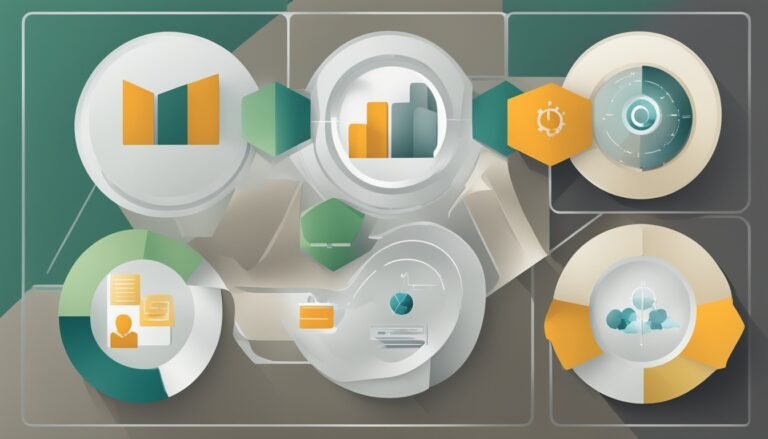Ethical Considerations in HR Technology Adoption
HR technology has changed the workplace, bringing both new ideas and ethical problems. Companies use AI for hiring and managing performance. But, they face big issues like privacy, data safety, and using AI responsibly.
A study found that 58% of HR experts now focus on using technology ethically. This is important because 56% of Americans worry about AI’s role in HR. They are concerned about bias and unfair treatment.
Companies that value fairness and clear AI algorithms see a 40% jump in HR tech use. They also keep employees longer, with up to 30% more retention than others. This shows the power of ethical tech use.
Using AI responsibly in HR is more than just avoiding legal issues. It’s about gaining trust. Companies that focus on ethical tech use are 60% less likely to face bias lawsuits. They also make employees more likely to recommend their company, with 67% saying they trust AI decisions.
Key Takeaways
- 58% of HR professionals prioritize ethical tech use
- Ethical AI implementation increases adoption by 40%
- Responsible AI practices improve employee retention by 30%
- 67% of employees recommend companies with trustworthy AI
- Ethical HR tech reduces discrimination lawsuits by 60%
Introduction to Ethical Considerations in HR Tech
HR technology is growing fast, bringing both good and bad. AI is changing HR, but it raises big questions about privacy, security, and fairness. A huge 86% of HR leaders believe AI will be key in HR’s future. But, 55% of employees are worried about AI’s ethics in HR.
When we talk about ethical HR tech, we mean keeping employee data safe, avoiding bias, and making decisions clear. HR leaders need to check AI systems and watch them closely to keep things right.
Making HR tech more human is key. AI can do boring tasks, saving 50% in hiring costs and time. It can also cut down errors by 84% in checking resumes. But, there’s worry AI might keep old biases, raising bias risks by up to 37%.
| AI Impact | Positive | Negative |
|---|---|---|
| Efficiency | 50% cost reduction | 41% decrease in autonomy |
| Accuracy | 84% error reduction | 37% increase in bias risk |
| Employee Trust | 72% with transparency | 63% privacy concerns |
To tackle these issues, companies should work on clear AI systems. When people understand AI, 72% trust HR decisions more. Getting employees involved in AI can cut down ethical worries by 33%.
The Impact of Data Privacy on Employee Trust
Data privacy is key to building trust in the workplace. With more HR tech, protecting employee data is more important than ever.
Understanding Data Privacy Regulations
Following data privacy laws is now crucial. The GDPR in the EU and the CCPA in the US are major rules for HR. Breaking these can hurt a company’s image and lead to big fines.
Employee Rights and Expectations
Workers expect their data to be safe. A Deloitte study showed 90% might quit if their data isn’t protected. This shows how vital it is to be open about how data is used.
Consequences of Breaching Privacy
Ignoring data privacy can cause big problems. IBM found 45% of breaches are due to employee mistakes. Companies need to use safe ways to collect data, limit who can see it, and check it often to keep it secure.
| Aspect | Statistic | Impact |
|---|---|---|
| Employee Concern | 60% would consider leaving | High turnover risk |
| Consumer Concern | 86% worried about data privacy | Potential brand damage |
| Data Breaches | Record high in 2022 | Increased security risks |
| Incident Response | 50% less breach costs | Cost savings potential |
As tech gets better, so must HR’s data privacy efforts. Companies like IBM lead the way with advanced data protection, including AI for threats.
Bias and Fairness in HR Algorithms
HR technology has changed how we manage workforces. But, it comes with its own set of challenges. Algorithms in HR can lead to biases, affecting fairness and equity.
Identifying Algorithmic Bias
HR tech algorithms can show biases in many ways. For example, gender bias can affect who gets picked for tech or leadership roles. Racial bias can lower ratings for people with “Black-sounding” names.
Age bias and biases based on accent, disability, and socioeconomic status are also big issues.
Addressing Bias through Transparency
Being open about how decisions are made is key to fighting algorithmic bias. Alignmark, with over 40 years in HR tech, stresses the need for thorough testing and ongoing checks of tools. This way, evaluations focus only on what candidates can do, not who they are.
| Bias Type | Impact | Mitigation Strategy |
|---|---|---|
| Gender Bias | Unfair assessments in technical/leadership roles | Diverse data sets, gender-neutral language |
| Racial Bias | Lower ratings for certain ethnic groups | Regular audits, bias detection tools |
| Age Discrimination | Favoring younger candidates inappropriately | Age-blind screening, skills-based assessments |
The Role of Human Oversight
AI and machine learning are big in HR tech, but humans are still key. HR pros are crucial for ethical tech use. They do audits, make fairness-first rules, and look for ways to fight bias.
This human touch is vital for keeping trust and fairness in HR.
Consent and Transparency in HR Technology
It’s key to be open when adopting HR technology. This means getting consent and being clear about data use. We’ll look at how to build trust and communicate well.
Importance of Informed Consent
Informed consent is key for ethical HR tech use. Employees want to know how their data is used. A study found 88% of workers want to know about data use.
This openness helps build trust and engagement.
How Transparency Builds Trust
Being open with HR tech builds trust. When companies share about AI use, employees feel valued. This leads to more engagement and better tech adoption.
Best Practices for Clear Communication
To ensure ethical HR tech use, follow these steps:
- Make clear policies for AI tool use
- Train all on AI ethics
- Have ways for employees to report concerns
- Encourage talking about ethical issues
- Keep employees updated on data use and protection
| Company | Action | Outcome |
|---|---|---|
| Mastercard | Implemented biometric authentication with transparency | Successful adoption and employee trust |
| IBM | Discontinued biased facial recognition system | Demonstrated commitment to fairness |
| Wells Fargo | Faced scrutiny for unauthorized biometric data access | Highlighted need for strict data protection |
By focusing on consent and transparency, companies can handle HR tech’s ethical issues. They keep employee trust and follow data protection rules.
Data Security and Protection Measures
In today’s digital world, keeping employee data safe is key for HR teams. With more HR tech, protecting sensitive info is a big deal. Let’s look at important steps to keep data secure and follow the rules.
Strategies for Securing Employee Data
HR teams must take strong steps to guard employee data. This means using top-notch encryption, strict access rules, and following data laws. A PwC survey shows 76% of HR folks think tech has made their data management better.
Importance of Regular Security Audits
Regular security checks are crucial to spot weak spots in HR systems. These audits help keep employee data safe. A Deloitte study found companies that audit often have 35% fewer data breaches than those that don’t.
Responding to Data Breaches
Even with good plans, data breaches can still happen. HR teams need clear plans for when this does. This includes telling affected employees fast and fixing the problem quickly. A data breach can cost $4.35 million, showing why quick action is vital.
- Implement multi-factor authentication to reduce unauthorized access attempts by 99.9%
- Train employees on data security, as 80% of breaches are due to human error
- Collaborate with IT departments to maintain a secure infrastructure for HR technology
By focusing on data security, HR teams can earn employee trust and follow privacy laws. This effort not only keeps data safe but also makes HR tech more effective.
Accessibility and Equity in HR Systems
HR technology is key to making workplaces inclusive. It uses advanced analytics and AI to cut down bias. This change is making companies more diverse and fair.
Ensuring Technology is Usable for Everyone
HR systems must be open to all employees. They should be designed for different abilities and backgrounds. For instance, AI helps in creating personalized training, making learning more inclusive.
Addressing Barriers for Diverse Groups
HR tech helps spot and fix unfairness in companies. Tools like performance management use data to ensure fairness. AI also finds pay gaps, helping to balance salaries.
Here are some important stats:
- Women software engineers in 2021 earned 91% of what men earned
- Only 2% of women in tech are Black or Hispanic
- 67% of tech companies have less than 5% Black employees
These numbers show the need for HR systems that support diversity. By using unbiased tools and analyzing data, companies can make workplaces fairer.
| HR Tech Solution | Impact on Equity |
|---|---|
| AI-driven recruitment tools | Reduce bias in candidate selection |
| Data analytics for pay equity | Identify and address salary disparities |
| Personalized learning platforms | Enhance skill development for all employees |
By focusing on accessibility and equity, companies can make sure everyone succeeds. This approach not only helps employees but also boosts the company’s success.
Ethical Recruitment Practices through Technology
AI in recruitment brings new challenges to HR. It’s important to keep hiring fair. Organizations must use AI responsibly to avoid biases.
Using AI Responsibly in Talent Acquisition
AI can make hiring easier, but it needs careful use. ADP started using AI ethically in 2019. They follow their Chief Data Officer’s guidance.
New York City now checks AI tools for bias in hiring. This sets a good example for using AI responsibly.
Maintaining a Fair Interview Process
It’s important to balance AI with human judgment in interviews. AI can learn biases from data. For example, Amazon’s AI model favored men because of past gender imbalances.
To fix this, HR teams should:
- Assume some AI data may be inaccurate or biased
- Develop clear policies for AI use in HR
- Provide training on ethical AI implications
- Collaborate with legal and compliance teams
Being open about AI in hiring builds trust. Regular checks of recruitment tech help find and fix unfair practices. This keeps ethics at the heart of HR technology.
The Role of Employee Feedback in Tech Adoption
Employee feedback is key to adopting HR technology ethically. Companies that value fairness and inclusion make sure employees can share their thoughts. This helps spot any ethical problems and makes HR systems work better.
Creating Channels for Employee Input
To follow ethical HR technology use, companies need to listen to their employees. They should offer many ways for feedback. This includes:
- Regular surveys
- Focus groups
- Open forums
- Anonymous suggestion boxes
By giving employees many ways to share their thoughts, companies can learn a lot. This helps them work towards fairness and inclusion.
Continuous Improvement through Feedback
Using feedback to keep improving HR technology is important. It means:
- Getting feedback
- Looking at the data
- Making changes
- Checking if things got better
This way, companies can make sure their HR tech meets employee needs. It builds trust and keeps employees engaged.
| Feedback Method | Effectiveness | Employee Participation Rate |
|---|---|---|
| Surveys | High | 75% |
| Focus Groups | Medium | 40% |
| Open Forums | Medium | 35% |
| Anonymous Suggestion Boxes | Low | 20% |
Using these feedback methods can really help improve HR technology use. Companies that focus on ethics in their HR tech saw a 38% jump in employee happiness.
Long-term Implications of HR Tech Adoption
HR technology adoption changes how organizations work. Companies use digital tools to be more efficient. But, they must also think about ethics. This balance is key to making HR tech work well for everyone in the long run.
Evaluating the Impact on Organizational Culture
HR tech changes how we work together. A study found that 84% of workers feel they don’t get enough from their bosses. This shows the need for HR tech to help everyone feel connected.
HR pros need to see how tech affects how employees feel and trust their bosses. For example, a new onboarding program cut new-hire turnover by 15%. This shows how good HR tech can make a big difference.
The Balance between Efficiency and Ethics
HR tech is great for getting things done fast. But, keeping ethics in mind is just as important. Here are some key points:
- Keep employee data safe to build trust
- Make sure HR tech fits with the company’s goals
- Check how well it works to see if it’s worth it
By focusing on these, companies can use tech to be efficient and still be ethical in HR.
| Aspect | Impact | Consideration |
|---|---|---|
| Communication | Improved connectivity | Ensure inclusive reach |
| Data Analytics | Informed decision-making | Maintain data privacy |
| Onboarding | Reduced turnover | Personalize experience |
The Future of HR Technology: Trends and Challenges
HR technology is changing fast, changing how companies manage their teams. AI Ethics Frameworks for HR are key as new tools come out. Let’s look at the future and the ethics of HR tech.
Emerging Technologies and Ethical Considerations
AI and machine learning are changing HR. They automate tasks, help in hiring, and offer insights. For instance, AI can quickly sort through many resumes to find the best candidates. But, this raises fairness and bias concerns in hiring.
Cloud-based HR solutions are scalable and give quick access to data. Yet, they also bring data security issues. Companies must focus on Ethical Governance in HR Technology to keep employee data safe.
Navigating Ethical Dilemmas Ahead
As HR tech gets better, ethical problems will grow. Data privacy is a big worry, especially with predictive analytics that might invade employee privacy. HR leaders must weigh the good of data insights against ethical issues.
Keeping a human touch in HR is also a challenge. AI chatbots can handle simple questions well, but they can’t offer empathy in tough times. It’s important to find a balance between using AI and keeping human interaction.
| Technology | Benefit | Ethical Consideration |
|---|---|---|
| AI Resume Screeners | Efficient candidate selection | Potential bias in algorithms |
| Predictive Analytics | Identify flight risks | Employee privacy concerns |
| AI Chatbots | 24/7 HR support | Lack of human empathy |
As HR tech keeps evolving, companies need strong AI Ethics Frameworks for HR. This makes sure new tech is ethical, building trust and fairness in the workplace.
Building an Ethical Framework for HR Technology
Creating a strong ethical foundation is key for using HR tech responsibly. Companies that build solid AI Ethics Frameworks for HR see happier employees. Let’s explore the main parts of an ethical HR framework and how to get everyone involved.
Key Elements of an Ethical HR Framework
A good framework for Ethical Governance in HR Technology should cover:
- Data privacy protection
- Fair treatment for all
- Clear communication
- Taking responsibility
These elements help build trust and ensure HR tech is used fairly. For example, IBM’s Trusted AI Initiative focuses on fairness and openness in AI systems.
Engaging Stakeholders in the Process
Getting different groups involved is vital when creating an ethical framework. This includes HR, IT, legal teams, and employee reps. Working together helps make sure all views are heard.
Setting up an AI ethics committee with people from various departments can guide ethical AI use. It’s also important to train HR staff on AI ethics so they can make smart choices.
| Action | Benefit |
|---|---|
| Create AI ethics committee | Ensures ethical AI use across departments |
| Train HR on AI ethics | Enables informed decision-making |
| Regular AI system audits | Maintains ethical alignment with company values |
Remember, an ethical framework isn’t set in stone. It needs regular updates to keep up with new tech and changing ethical standards. By focusing on ethics, companies can use HR tech in ways that benefit everyone.
Conclusion: Moving Forward with Ethical HR Technology
Looking ahead, ethics must guide HR technology. Using responsible AI in HR builds trust and a better work place. With 72% of companies tracking employee performance with tech, this trend is set to grow.
Emphasizing the Importance of Ethics
Ethics are key in HR tech adoption. While 92% of HR leaders see data and analytics as crucial, only 29% of employees trust AI use. This shows the need for openness and ethical actions. Companies ignoring these issues see a 25% drop in morale and a 15% rise in turnover.
Commitment to Continuous Ethical Evaluation
Organizations must keep checking their HR tech’s ethics. IBM and Salesforce are leading with their AI ethics frameworks. By following these and using tools like the World Economic Forum’s “Ethical AI Toolkit,” companies can make sure their tech supports human values.
Source Links
- Ethical Considerations in AI-driven HR Decision Making
- AI Ethics: Implications for Human Resource Leaders
- Ethical AI: Navigating the Moral Landscape of AI-Driven HR
- Ethical Implications of AI in HR
- The Ethics of AI in HR: Balancing Efficiency and Fairness
- The Role Of Data Privacy In HR: Balancing Transparency And Confidentiality
- What are the ethical considerations surrounding data privacy in HR digital transformation efforts?
- Navigating Ethical Considerations in HR Technology Implementation
- Algorithmic Bias
- What ethical considerations should HR professionals take into account when adopting biometric technology in the workplace?
- Data Privacy and Ethical Considerations in AI-Driven Recruitment
- The role of technology in maintaining ethical standards in HR practices.
- Data Privacy and Security Trends in HR Technology
- From Bias to Belonging: The Role of HR Tech in Building Inclusive Workplaces
- Council Post: Ethics And Compliance Are Vital When Applying AI Tools In HR
- HR for Tech Industries
- Navigating Ethical Challenges in AI Adoption
- Human resource technology disruptions and their implications for human resources management in healthcare organizations
- Council Post: AI Bias In Recruitment: Ethical Implications And Transparency
- Ethical Implications of Technology in HR
- Ethical Considerations in HR Technology Adoption | Human Resources | My Bites
- HR Tech Takes Center Stage in Addressing Work Challenges
- HR Tech Revolution | Data-driven Collaboration
- The Future of HR Technology
- The Future of HR: How Technology is Transforming Human Resource Management
- Ethical AI: guidelines and best practices for HR pros
- The ethics of AI and HR: Balancing efficiency and fairness in recruitment
- Ethical Considerations in Using AI for HR | myHRfuture
- What are the potential ethical implications of using technology for performance monitoring in HR?
- In what ways can HR professionals uphold ethical standards while using technology and data analytics in decisionmaking processes?
- Striking an ethical balance between AI and HR: Here’s how – ETHRWorldSEA








